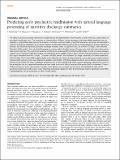Predicting early psychiatric readmission with natural language processing of narrative discharge summaries
Author(s)
Castro, V M; McCoy, T H; Perlis, R H; Naumann, Tristan; Szolovits, Peter; Rumshisky, Anna A.; Ghassemi, Marzyeh; ... Show more Show less
DownloadRumshisky-2016-Predicting early psychiatric re.pdf (366.8Kb)
PUBLISHER_CC
Publisher with Creative Commons License
Creative Commons Attribution
Terms of use
Metadata
Show full item recordAbstract
The ability to predict psychiatric readmission would facilitate the development of interventions to reduce this risk, a major driver of psychiatric health-care costs. The symptoms or characteristics of illness course necessary to develop reliable predictors are not available in coded billing data, but may be present in narrative electronic health record (EHR) discharge summaries. We identified a cohort of individuals admitted to a psychiatric inpatient unit between 1994 and 2012 with a principal diagnosis of major depressive disorder, and extracted inpatient psychiatric discharge narrative notes. Using these data, we trained a 75-topic Latent Dirichlet Allocation (LDA) model, a form of natural language processing, which identifies groups of words associated with topics discussed in a document collection. The cohort was randomly split to derive a training (70%) and testing (30%) data set, and we trained separate support vector machine models for baseline clinical features alone, baseline features plus common individual words and the above plus topics identified from the 75-topic LDA model. Of 4687 patients with inpatient discharge summaries, 470 were readmitted within 30 days. The 75-topic LDA model included topics linked to psychiatric symptoms (suicide, severe depression, anxiety, trauma, eating/weight and panic) and major depressive disorder comorbidities (infection, postpartum, brain tumor, diarrhea and pulmonary disease). By including LDA topics, prediction of readmission, as measured by area under receiver-operating characteristic curves in the testing data set, was improved from baseline (area under the curve 0.618) to baseline+1000 words (0.682) to baseline+75 topics (0.784). Inclusion of topics derived from narrative notes allows more accurate discrimination of individuals at high risk for psychiatric readmission in this cohort. Topic modeling and related approaches offer the potential to improve prediction using EHRs, if generalizability can be established in other clinical cohorts.
Date issued
2016-10Department
Massachusetts Institute of Technology. Computer Science and Artificial Intelligence Laboratory; Massachusetts Institute of Technology. Department of Electrical Engineering and Computer ScienceJournal
Translational Psychiatry
Publisher
Nature Publishing Group
Citation
Rumshisky, A et al. “Predicting Early Psychiatric Readmission with Natural Language Processing of Narrative Discharge Summaries.” Translational Psychiatry 6.10 (2016): e921.
Version: Final published version
ISSN
2158-3188